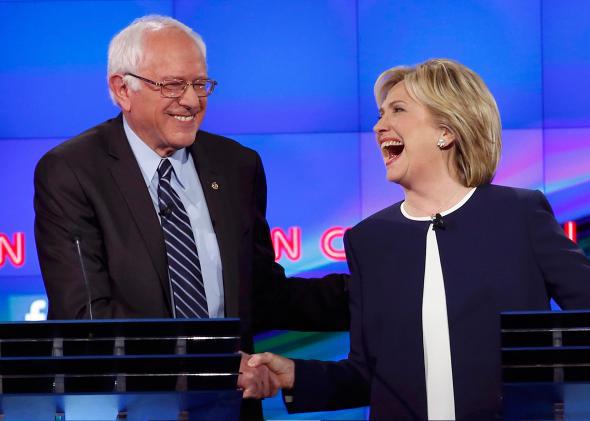LAS VEGAS—Democratic Party officials and representatives in Las Vegas expressed plenty of optimism ahead of Tuesday night’s debate, to the point that they seemed naïve. These Democrats viewed the debate as a branding opportunity, a means of distancing the party from the foaming beast that emerges whenever Republican candidates gather to debate. The Democrats would spar and elucidate policy differences, but they would do so respectfully and without the interpersonal animus that’s dominated the first two cluttered Republican stages. They would entertain, but through lively discussion—not through Trumpian suplexes or nativist bromides.
It sounded fantastical and overly optimistic ahead of the debate. But it’s basically what they got.
Hillary Clinton was able not just to survive the debate, but prosper. She was still unable to coherently explain her recent decision not to support the Trans-Pacific Partnership. And her line about how she “went to Wall Street in December of 2007 before the big crash that we had and I basically said, ‘Cut it out,’ ” was more than a little limp. But she was able to demonstrate her strength—her mastery of public policy details—and, thanks to her rival Bernie Sanders, she began putting the wreckage of her email fiasco behind her. She showed that there is, after all, a reason for the Democratic Party to line up behind her: Put in the right situations, she’s pretty good at politics.
Aside from a dreadful attempt to defend his history of voting against certain gun control measures, and one moment in which he appeared not to be paying attention to a conversation about Vladimir Putin, Sanders also prospered. He finally got his answer about Black Lives Matter down, and he seemed to genuinely understand that he had been wrong, previously, in relegating the concerns of racial justice activists. He weathered a fairly relentless assault from moderator Anderson Cooper over his self-identification as a “democratic socialist.” (CNN telegraphed those questions in the runup to the debate by holding roughly 10 trillion pre-debate segments about the scandalous nature of Sanders’ ideological description.)
Martin O’Malley was able to “introduce himself” to the country in a positive light while jabbing when the moment called for it. He opened the debate in an uncomfortably slow, quiet voice, but demonstrated more passion and resolve when not letting Sanders off the hook during the exchange over gun control. O’Malley won’t leap to the top of post-debate polls Wednesday morning. But he got the “enhanced introduction” he sought and justified his continued existence in the campaign.
Meanwhile: Jim Webb whined about his lack of time too much but then said something funny and weird about killing a man, so he’s OK. Lincoln Chafee was terrible, but at least he didn’t get in the real candidates’ way. Win!
It was O’Malley who delivered the earnest wrapup that the Democratic National Committee wanted in his closing statement. “On this stage, you didn’t hear anyone denigrate women, you didn’t hear anyone make racist comments about new American immigrants, you didn’t hear anyone speak ill of another American because of their religious belief,” he said, before concluding: “That tells me we are moving to a more connected, generous, and compassionate place, and we need to speak to the goodness within our country.”
O’Malley was in swell spirits afterward—though an interview with a Twitter troll in the hallway didn’t help—and affirmed that he would continue his push to increase the number of debates from six. “Didn’t you think tonight was fun? Don’t you think we should have more?” he said, adding that he hoped Tuesday night’s display would “embolden” those calling for more debates and persuade chairwoman Debbie Wasserman Schultz.
We’ll see.
For all the optimism party leaders are feeling Tuesday night, not all debates will be this cuddly. The issue at hand is the compression of time. Part of the reason that Republican debates have been so vicious thus far—aside from Donald Trump’s presence—is that candidates have more to prove before the mower comes their way, as it already did for Rick Perry and Scott Walker. The Democratic field is already small—pre-whittled, one might say. There’s no rush.
By the time Iowa and New Hampshire come around, though? Sanders may not be so willing to help Clinton out of her email situation. Wasserman Schultz surely understands this, even if she’s incapable of explaining it properly. But for the first debate, the Democrats, as a body, did what they needed to do: made it through 2½ hours without demonstrably wounding their collective cause.
See all of Slate’s coverage of the Democratic primary debate.
